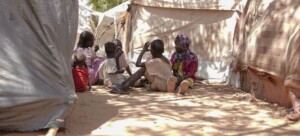East Darfur capital bans South Sudanese because of cholera
On Sunday, the Commissioner of Ed Daein in East Darfur has ordered the evacuation of South Sudanese refugees from the town within 72 hours, to prevent the spread of cholera. The Kario refugee camp has been isolated. The North Darfur Health Ministry will send medical teams to a number of localities.
On Sunday, the Commissioner of Ed Daein in East Darfur has ordered the evacuation of South Sudanese refugees from the town within 72 hours, to prevent the spread of cholera. The Kario refugee camp has been isolated. The North Darfur Health Ministry will send medical investigation teams to a number of localities.
Following reports about cases of cholera among Southern Sudanese refugees in the camps south of the state capital of Ed Daein, the commissioner issued two decrees concerning the influx of South Sudanese into the town. The first concerns the evacuation of refugees from Ed Daein, and the second order prohibits the transport of refugees from the camps to the capital.
Anyone who opposes or ignores the decrees will be held legally accountable, he repeated in a press statement in Ed Daein on Sunday. Owners of vehicles that violate the decree will be subjected to a fine of SDG 10,000 ($1,300).
The Kario refugee camp in Bahar El Arab locality has been isolated from its surroundings.
On Sunday, a youth leader at the camp told Radio Dabanga that the commissioner of Bahar El Arab, in an attempt to prevent the spread of the epidemic to the rest of the locality, banned the traffic to and from the site except staff of organisations operating in the camp.
“Since Friday, policemen are barring people from entering or leaving the camp, until the health conditions in the area have improved,” he said.
‘Watery diarrhoea’
Between August 2016 and May 2017, 14,659 people were infected with “watery diarrhoea”. 292 patients died, the Sudanese Minister of Health reported in early June.
Though doctors in Sudan and abroad have repeatedly appealed to the government in Khartoum to acknowledge the spread of cholera, the authorities continue to call the disease “acute watery diarrhoea”. The press and medics in the country have been warned not to mention the infection’s real name.
Tawila
On Sunday, a relative of a patient at the Tabit Health Centre reported four new cholera cases that day. “12 people are now being being treated at the centre.”
The North Darfur Minister of Health, Mohamed Awadallah, reported the death of one “watery diarrhoea” patient, and four new infections in the area of Tabit in Tawila locality last week. Suspected cases were recorded in the neighbouring localities of Kutum and Kabkabiya.
The Minister called for the need to train health personnel and intensify awareness campaigns among the people in the towns and the camps for the displaced in the state and to provide medicines and isolation units.
He told reporters in El Fasher, capital of North Darfur, that investigation and awareness raising teams will be sent to the localities of Mellit, El Malha, Kutum, Karnoi, Um Baru, El Tina, El Sareif, Saraf Omra, Kabkabiya, and Tawila.
South Sudan
In war-torn South Sudan, doctors, aid workers and officials in South Sudan are warning of a “devastating” outbreak of cholera that could kill thousands of people in a country where millions are already threatened by famine.
More than 2,500 cases of the disease have been registered since April, a sharp increase over previous months, the Guardian reported on Sunday. The total over the last year has now risen to 8,000, with about 250 confirmed deaths. Experts say this is likely to be only a fraction of the overall toll.
Follow #CholeraInSudan, # ألكوليرا_السودان for ongoing coverage by Radio Dabanga











 and then
and then